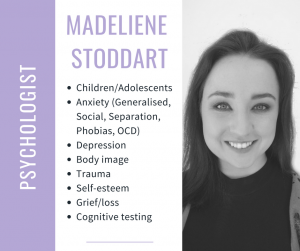
We can all relate to a time when we had to do something that we didn’t want to or were scared to do. For some people, coming to therapy for the first time can be a really confronting experience. For a young person, it can be even harder. We want to ease some of those fears and help make your child’s first appointment easier to attend.
[headline style=”2″ font_color=”%23b4a7d6″ align=”center” headline_tag=”h2″]Possible reasons why your child may not wish to attend:
[/headline]
➡ Going to a new place, meeting a stranger, and having to talk about feelings can be overwhelming.
➡ They’ve worked extremely hard to bottle their emotions and they’re worried if they talk about it they will be overwhelmed by them.
➡ They’ve worked hard to “numb” themselves emotionally and talking about it means they have to feel them again. The thought of this can be terrifying.
➡ If they’re suffering from symptoms of depression, they might be thinking it is pointless or they don’t deserve to feel better. Finding the motivation to attend therapy may feel all too hard.
➡ For a teenager, the last thing they want is to feel “weird” or different to others. If they are aware that their mental health is suffering, they might want to avoid addressing it because that makes it “real”.
➡ They may not recognise how serious their mental health concerns are. They may believe they just need to “push through it”.
➡ They may worry that their friends or classmates will judge them.
➡ They might feel that they are alone and no one else is going through what they are; they think their psychologist is just another adult who won’t understand them.
➡ They think it won’t help or they can’t be helped.
➡ Something traumatic has happened and thinking about it is painful and distressing.
There are other possible reasons for why your child might avoid attending their first appointment, but the most important thing to remember is that it is unlikely because they are “just being difficult”. Their resistance is not bad behaviour, it is based on real fear and valid reasons.
Your child is likely going through a hard time and may need extra support to get them to their session. After the first session, most people find subsequent sessions much easier. Below are some tips for encouraging your child to attend. However, keep in mind that pushing them too much might build a barrier to therapy in the future. It is important to encourage them to come, but not force them.
[headline style=”2″ font_color=”%23b4a7d6″ align=”center” headline_tag=”h2″] Tips to Help Them Attend Their First Appointment
[/headline]
➡ Normalise therapy for them. This means letting them know that they are not alone and explaining that many people see a psychologist. If you have your own experience of mental health concerns, you might want to let them know you attended therapy and what benefits you found. It may also help to tell them how you felt going to your first appointment.
➡ Validate their experience. Let them know that you appreciate how scary/ hard it is to confront their feelings or talk about what is going on for them. Tell them you will support them the whole way, whether they decide to go or not. For example, “The idea of talking talking to someone about how you’re feeling can be really scary, but if there’s a chance they can help then maybe it’s worth it. I will support you the whole way, but I won’t force you to go if you’re not ready”.
➡ Encourage them to go to their appointment, but don’t become angry with them if they refuse. It might not be the right time for them. This can be frustrating for parents as you desperately want to see your child get the help they need, however, pushing them to go will make it harder in the future. Instead, gently encourage them to seek help, and let them know you are there for them if they want to talk. Let it be their choice.
➡ Frame therapy in a positive way. Let them know they will be guided by their psychologist if they don’t know what to talk about. Explain that they will never be forced to talk about anything they don’t want to, and what they talk about with the therapist will be confidential.
➡ Ease their worries about therapy. Gently ask them what is worrying them about seeing a psychologist. Talk this through with them, validating their fears and encouraging them to give it a try. If they attend one appointment and decide they don’t want to continue, let them know you are okay with that. It might help to show them the website and allow them to choose their psychologist. If you feel it would be beneficial, we are happy to have a chat with them over the phone prior to their session to answer any questions they have about attending.
➡ Reward them for even thinking about going. For younger children, it might be helpful to arrange to go for a treat after the session (e.g., do a fun activity together). It will provide the opportunity to ask them how it went and reinforce your stance that it is their choice to go. It is important that a reward does not become a bribe, and never punish them for not attending or deciding not to continue. For teens it might be helpful to give them the afternoon or morning off school while they attend their appointment so that they have time to process the session and don’t have to worry about explaining their absence to their friends.
[button_1 text=”Download%20Article” text_size=”32″ text_color=”#ffffff” text_bold=”Y” text_letter_spacing=”0″ subtext_panel=”N” text_shadow_panel=”N” styling_width=”40″ styling_height=”30″ styling_border_color=”#ffffff” styling_border_size=”1″ styling_border_radius=”6″ styling_border_opacity=”100″ styling_shine=”Y” styling_gradient_start_color=”#b4a7d6″ styling_gradient_end_color=”#b4a7d6″ drop_shadow_panel=”N” inset_shadow_panel=”N” align=”center” href=”https://www.mppsych.com.au/wp-content/uploads/2018/07/Maddie-Introducing-Therapy-To-Your-Child.pdf” new_window=”Y”/]
[video_player type=”youtube” style=”1″ dimensions=”560×315″ width=”560″ height=”315″ align=”center” margin_top=”0″ margin_bottom=”20″ ipad_color=”black”]aHR0cHM6Ly95b3V0dS5iZS9yYmd3NjRoVGNrbw==[/video_player]
[headline style=”2″ font_color=”%23b4a7d6″ align=”center” headline_tag=”h2″]About The Author
[/headline]

Maddie believes that everyone has the strength to overcome life’s obstacles, but sometimes you just need some extra support or a new approach to get you there. She works with all ages using evidence-based therapies and is looking forward to working beside you in your journey to better mental health.
